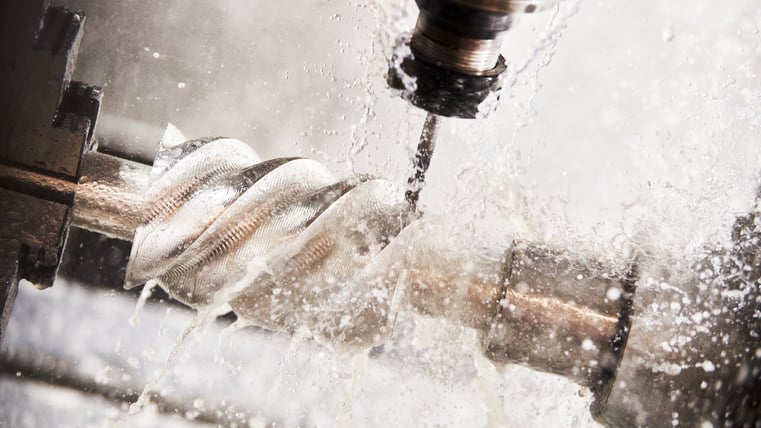Exploring Types of Metalworking Fluids – Deep Dive into Evolving Lubricants, Coolants and Emulsifiers
Used to craft such metal products as blades, vehicle parts and tools, metalworking is an essential process in today’s manufacturing environment. There are four main types of metalworking fluids: straight neat oils, synthetic fluids, semi-synthetic fluids and soluble oils, also known as emulsifiable oils.
Several processes are in play when manufacturing metal products. Some of the most common manufacturing activities that require metalworking fluids are milling, turning, grinding, casting, drawing and heading and stamping.
Getting the best performance out of modern metalworking fluids requires constant monitoring and adjustment, but doing these tasks without coordination is not ideal.
Basics of metalworking fluids: benefits of oil-based and water-based formulations
Straight oils can be made up of mineral, vegetable, or animal oils. They are generally considered quite versatile, making them a good fit for heavy-duty machining processes. Straight oils are not diluted with water, although extreme pressure agents are often added to formulations to enhance performance.
Synthetic fluids contain no mineral oil, only synthetic base stocks. They are used to keep the workpiece continuously wet to prevent mist and smoke, specifically during the grinding process. Compared to other options synthetic fluids are not as capable of preventing corrosion and can be harsh on the tool over time.
Semi-synthetic fluids contain anywhere from 5-30% mineral oil and are diluted with 30-50% water. They are metal cutting all-rounders with effective cooling and lubrication abilities, thanks to high concentrations of additives.
Emulsifiable or water-soluble oils contain about 40%-70% pure mineral oils as well as emulsifying additives to allow it to mix with water. Soluble oils are used as both coolants and lubricants, particularly in cutting and grinding processes. They slow welding between cutting tools and the workpiece, while also preventing tool wear.
Choosing between types of metalworking fluids depends heavily on the type of problem they are meant to solve. Furthermore, additives can be used in metalworking formulations to aid in inhibiting corrosion, enhancing performance, preventing mist, emulsifying or improving odor.
Any metalworking fluid that contains water will include some type of biocide, which is generally considered an additive, because water is conducive to the growth of microorganisms. The presence of microorganisms can result in health and safety hazards, separation of emulsions, creation of sediments, formation of biofilms, and metal corrosion. Preventing unwanted microbial activity and resulting harm is one of the reasons regulations around metalworking fluids being altered.

Changes in metalworking fluid regulations, safety and efficiency
The industry has made great strides in ensuring that metalworking fluids are safe for those who work with them. For the last decade and a half, the European Union has tightened regulations surrounding the use of boron and some formaldehyde-releasing biocides in industrial applications.
Manufacturers started developing their products, which in turn boosted the competition in the whole market. Many older products were replaced with newly developed alternatives, that not only were safer for people that used them, but also performed better. For example, Castrol developed their XBB-series entirely without boron or biocides to produce a truly sustainable solution that requires less maintenance and unnecessary repairs.
Even though boron and formaldehyde-releasing agents are very effective in formulations meant for different industrial and machining purposes, they can be detrimental for the health and safety of operators. Finding solutions that are both effective and truly sustainable is currently the main challenge for the whole industry.
Products with effective heat dissipation and stable pH value reduce the need for expensive additive top-ups, eliminate unnecessary repairs and help avoid toxic waste generated from changing fluids. Increased productivity, efficiency and enhanced competitiveness can be achieved through the right formulation; with more stable pH value, microbial activity is lower and there is less need for high-cost additives to battle this. Stable pH also helps with battling corrosion and reducing maintenance costs.
To get to know Castrol XBB and other metalworking fluid solutions Telko has to offer, read more on our product page here: Telko metalworking fluids.
To get in touch with Telko’s metalworking engineers, contact us.
Teemu Mikkola
Business Line Director Lubricants. Teemu Mikkola is responsible for Telko's Industrial Lubricants segment. His background is engineering (M.Sc.Eng), with around 20 years of experience in sales and directing sales for Telko.





